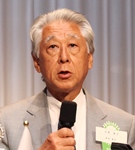��Environmental Protection Month�� Meeting
Sailing and the Environment
May 21, 2014
Mr. Hirobumi Kawano
President, Japan Sailing Federation
�� Japan Sailing Federation is a public interest incorporated foundation with about 10,000 members throughout Japan. Her Imperial Highness Princess Takamado is the honorary president of the Federation with a history over 80 years. It affiliates many organizations, including prefectural federations, oceanic organizations for large-scale vessels as well as organizations for yachts classified by different fleets and categories. The Federation undertakes wide-ranging tasks that include organizing the National Sports Festival of Japan, training and sending athletes to the Olympics, sound development and dissemination of maritime affairs as well as conservation of the marine environment.
Japan Sailing Federation is a public interest incorporated foundation with about 10,000 members throughout Japan. Her Imperial Highness Princess Takamado is the honorary president of the Federation with a history over 80 years. It affiliates many organizations, including prefectural federations, oceanic organizations for large-scale vessels as well as organizations for yachts classified by different fleets and categories. The Federation undertakes wide-ranging tasks that include organizing the National Sports Festival of Japan, training and sending athletes to the Olympics, sound development and dissemination of maritime affairs as well as conservation of the marine environment.
��As we will be hosting the 2020 Olympics in Tokyo, sailing events will take place at Tokyo Bay. Construction of the Olympic Harbor is scheduled to start next year at Wakasu, Koto Ward. The Federation assumes the weighty responsibility of organizing the Olympics that should satisfy yacht sailors, Olympic executives and legions of fans who will gather from all over the world.
��For example, we need at least 500 volunteers who understand the rules of yacht competition to organize the events. We must also enhance our training programs so that Japanese athletes will bring more medals back home from the 2016 Olympics in Rio de Janeiro and the 2020 Tokyo Olympics.
��There are 10 sailing events contested in the Olympic Games, of which ��470�� best fits the Japanese in terms of physical frame, weight and height. Japan has won the bronze medal for ��men��s 470�� at the 2004 Athens Olympics and silver medal for ��women��s 470�� at the 1996 Atlanta Olympics. The one-person ��Laser Radial�� and ��Laser�� are also relatively easy for the Japanese to sail. Another one-person ��Finn�� is similar to ��Laser�� but the Japanese has a disadvantage in sailing this heavyweight dinghy. ��NACRA�� is a catamaran that Japanese sailors lack experience in and we must give intensive trainings towards the 2020 Tokyo Olympics. The two-person ��49er�� and ��29er�� require much skill to keep the balance. Japanese sailors did well in ��RS:X (men��s and women��s)�� at the 2008 Beijing Olympics, as physically they were better suited to this windsurfing event.
��Sailing events take place simultaneously at 4 to 5 race areas during the Olympic Games. Taking this opportunity, I am committed to further improve the water quality of Tokyo Bay. We conducted independent water quality studies during the Olympic bid campaigns and have confirmed its water quality meets the standards of bathing beaches. Sailors from overseas are extremely sensitive about the issue of radiation-contaminated water. Although our measurements confirmed that radiation was ��not detected,�� we must strive to dispel their concerns in making preparations for the Olympics.
��Let me illustrate some ��Environmentally Friendly Projects�� taken by our Federation under the slogan, ��Let��s hand down the clean ocean.�� Our watchword is ��Let Poseidon Live!�� As you know, Poseidon is the ��God of the Sea�� in the Greek mythology and we resolve to conserve clean environment over centuries.
��As I explained earlier, there are many different types of yachts and a variety of categories and events in which sailors from young children to businessmen participate. Out of about 50 All Japan Championship matches held each year, we chose 35 matches (with about 4,800 participants) last year as environmental campaign races. In collaboration with our sponsors, we provided financial assistance to organize eco-friendly matches. They asked participants to clean up the beach, sailors to pick up garbage found in the sea as well as prohibited dumping garbage by clarifying the rule in the sailing instruction. We also undertake recycling activities and turn used sails into bags and sunshades. We taught how to make eco-friendly shopping bags from spin sail during the National Sports Festival held in Tokyo last year.
��We made stickers for both cars and boats calling to ��Stop! Idling�� and turn off the engine. When we use one liter of gasoline, we generate an enormous amount of carbon dioxide worth 590 bottles of two-liter PET bottles. We hope the stickers will encourage energy saving as well as environmental conservation both on land and the ocean.
��We also launched the environment contest last year and subsidized excellent projects towards their implementation. We invite project proposals related to environmental activities from across Japan that can include organizing environment-related events, purchasing some furniture and fixtures to be utilized in environmental conservation activities and making something for the environment. The idea of stickers that I have just mentioned about actually came from last year��s contest. You don��t have to be a sailor to make an entry into the contest. We would be happy to get proposals from many of you to the ��Environment Contest 2014�� (application deadline is July 6, 2014).
��These activities might be a small step. Yet, we are determined to gear up our activities towards the 2020 Tokyo Olympics so that people from around the world can enjoy races in a clean and safe environment. Let me close my speech by asking for your support and encouragement to the Japanese athletes.